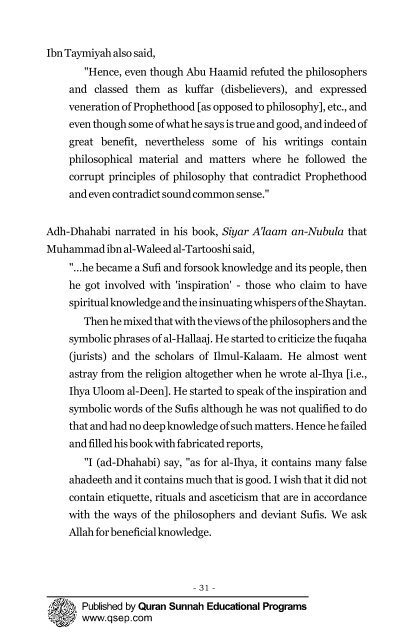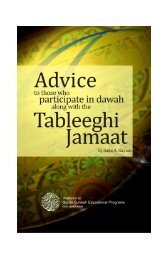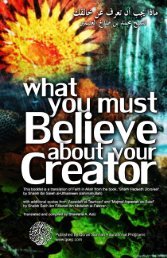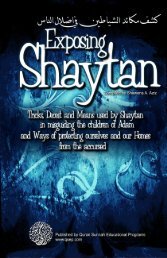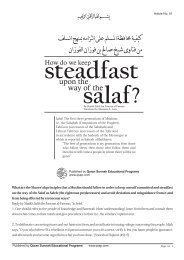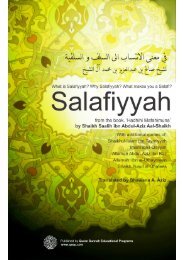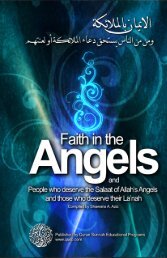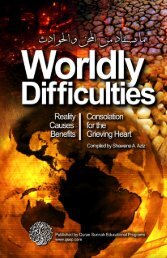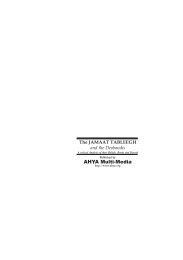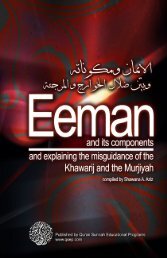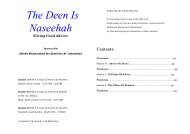A critical analysis of the Modernists and the ... - Kalamullah.Com
A critical analysis of the Modernists and the ... - Kalamullah.Com
A critical analysis of the Modernists and the ... - Kalamullah.Com
Create successful ePaper yourself
Turn your PDF publications into a flip-book with our unique Google optimized e-Paper software.
Ibn Taymiyah also said,<br />
"Hence, even though Abu Haamid refuted <strong>the</strong> philosophers<br />
<strong>and</strong> classed <strong>the</strong>m as kuffar (disbelievers), <strong>and</strong> expressed<br />
veneration <strong>of</strong> Prophethood [as opposed to philosophy], etc., <strong>and</strong><br />
even though some <strong>of</strong> what he says is true <strong>and</strong> good, <strong>and</strong> indeed <strong>of</strong><br />
great benefit, never<strong>the</strong>less some <strong>of</strong> his writings contain<br />
philosophical material <strong>and</strong> matters where he followed <strong>the</strong><br />
corrupt principles <strong>of</strong> philosophy that contradict Prophethood<br />
<strong>and</strong> even contradict sound common sense."<br />
Adh-Dhahabi narrated in his book, Siyar A'laam an-Nubula that<br />
Muhammad ibn al-Waleed al-Tartooshi said,<br />
"…he became a Sufi <strong>and</strong> forsook knowledge <strong>and</strong> its people, <strong>the</strong>n<br />
he got involved with 'inspiration' - those who claim to have<br />
spiritual knowledge <strong>and</strong> <strong>the</strong> insinuating whispers <strong>of</strong> <strong>the</strong> Shaytan.<br />
Then he mixed that with <strong>the</strong> views <strong>of</strong> <strong>the</strong> philosophers <strong>and</strong> <strong>the</strong><br />
symbolic phrases <strong>of</strong> al-Hallaaj. He started to criticize <strong>the</strong> fuqaha<br />
(jurists) <strong>and</strong> <strong>the</strong> scholars <strong>of</strong> Ilmul-Kalaam. He almost went<br />
astray from <strong>the</strong> religion altoge<strong>the</strong>r when he wrote al-Ihya [i.e.,<br />
Ihya Uloom al-Deen]. He started to speak <strong>of</strong> <strong>the</strong> inspiration <strong>and</strong><br />
symbolic words <strong>of</strong> <strong>the</strong> Sufis although he was not qualified to do<br />
that <strong>and</strong> had no deep knowledge <strong>of</strong> such matters. Hence he failed<br />
<strong>and</strong> filled his book with fabricated reports,<br />
"I (ad-Dhahabi) say, "as for al-Ihya, it contains many false<br />
ahadeeth <strong>and</strong> it contains much that is good. I wish that it did not<br />
contain etiquette, rituals <strong>and</strong> asceticism that are in accordance<br />
with <strong>the</strong> ways <strong>of</strong> <strong>the</strong> philosophers <strong>and</strong> deviant Sufis. We ask<br />
Allah for beneficial knowledge.<br />
- 31 -


